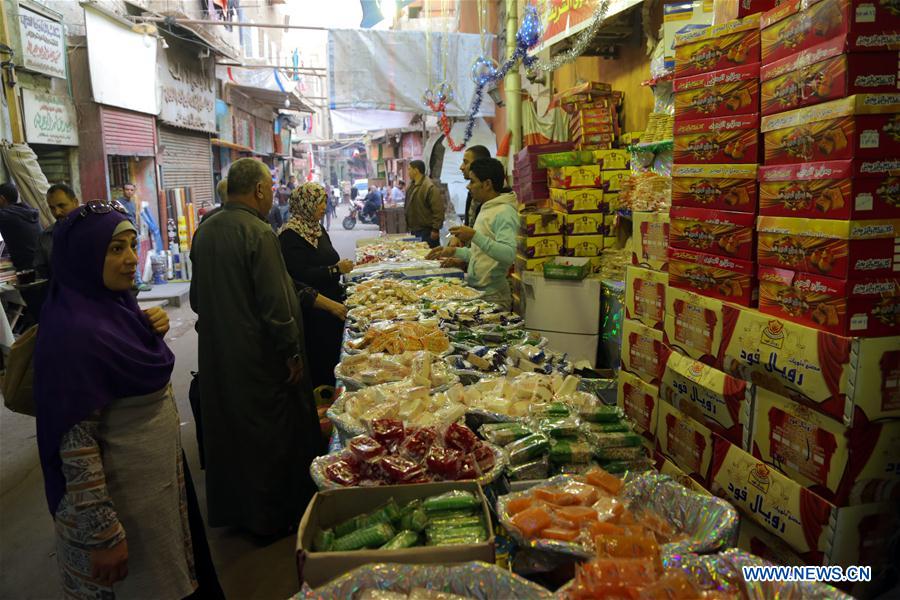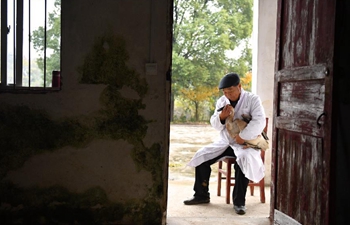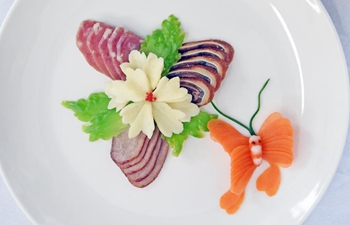
People buy special candies and sweets for the Prophet Muhammad's birthday celebration at a market in Cairo, Egypt, on Nov. 22, 2017. In Egypt, the birthday of Islam's Prophet Muhammad falls this year on Dec. 1. As the anniversary gets closer, shops and streets across Egypt get crowded with distinctive sweets, with customers wondering around to buy the feast's candies. (Xinhua/Ahmed Gomaa)
by Emad al-Azrak, Ahmed Shafiq
CAIRO, Nov. 29 (Xinhua) -- Commemorating the birthday of Islam's Prophet Muhammad has a special taste is Egypt as Muslims flock to buy special candies and sweets.
The special sweets have been a major feature of Egyptian celebrations of the Prophet's birthday ever since the Fatimid dynasty launched the tradition in 973 of the Hijri calendar.
Prophet Mohamed's birthday is observed by Sunni Muslims on the 12th of Rabi' Al-Awwal, the third month in the Islamic lunar calendar, or on the 17th of the same month by Shiite Muslims.
In Egypt, it falls this year on Friday, December 1st.
Welcoming the occasion, Egyptians decorate streets and homes with colorful lamps and silk cloths and set up tents for Sufi chants and praise the Muslims prophet.
Rich people hold large free banquets for the poor, while thousands gather in mosques for prayers, reciting Quran (Muslims' Holy Book).
As the anniversary gets closer, shops and streets across Egypt get crowded with distinctive sweets, with customers wondering around to buy the feast's candies.
Bab al-Bahr Street in Cairo is considered one of the most important and most specialized streets in selling and making this type of candies.
Nowadays, the street is crowded with thousands of Egyptian seeking to get high quality and low-priced candies.
"There is a wide turnout on various types of candy," Mohammed Ramadan, owner of a candy shop in Bab al-Bahr Street told Xinhua.
"The most popular varieties this year are the beans, sesame and chickpeas candies since their prices are affordable."
He added that his shop introduces new varieties every year to attract customers. "I want to satisfy all tastes and levels... This season I also have hazelnut, cashew nuts, pistachios and other items."
He pointed out that the high prices have had a significant impact on sales rates, compared to last year or previous years.
"The turnout has not changed but the quantities purchased are much less than in previous years," he complained as his eyes rolled in search of customers.
Ramadan noted that the high prices of sweets came as a result of the rise in prices of raw materials, pointing out that this rise is not limited to candies.
During Islam's early days, the Prophet's birthday, or Mawlid al-Nabi, wasn't celebrated.
However, it is currently an official holiday in 47 Muslim countries, spanning from the Middle Eastern to Africa and Malaysia.
Still, the celebrations in Egypt are the largest in the Middle East with Sufi Muslims the biggest devotees of this Holy day.
Some Muslim sects, however, do not observe the Mawlid al-Nabi occasion, such as the Salafis and Wahabis, believing that it must not be celebrated since the Prophet did not celebrate his own birthday during his lifetime.
Not far away from Ramadan's shop, Mohsen Abu Habbaba, another candy seller, was busy arranging his shop front with his best goods to attract more shoppers.
"I'm keen to provide a variety of different candies to suit all tastes and levels," he said.
The man added that the price of one kilo of candies starts from 40 Egyptian pounds (1 U.S. dollars=17.70 pounds), while the price of a kilo of jams starts from 65 pounds.
"This year's turnout is modest compared to last year," Abu Habbaba told Xinhua. "Some of those who used to buy large quantities to distribute to the poor reduced their request."
Prices of the festivity's candies vary according to the geographical area, income and shops. Price of one kilo at shops ranges from 40 to 680 pounds.
"The quality of sweets this year very good, but prices are extremely high," said 60-year-old Abdel Nasser Abdullah while buying some candies with his 20-year-old daughter.
"In recent years, I used to buy some five to seven kg of candies, but this year I will not buy more than three to four kg due to high prices," Abdullah told Xinhua.
Egypt, the most populous Arab country, has been suffering economic recession due to political instability and relevant security challenges following two uprisings that toppled two heads of state since 2011.
The turmoil led to a decline in the country's foreign currency reserves, foreign investments, tourism revenues and others.
Egypt's current leadership led by President Abdel-Fattah al-Sisi is working hard to attract foreign investments despite its ongoing anti-terror war that killed hundreds of policemen, soldiers and civilians over the past few years.
Besides floating its local currency's exchange rate to face dollar shortage, Egypt started last year a strict three-year economic reform program including austerity measures, fuel subsidy cuts and tax increase.
The program is encouraged by a 12-billion-dollar loan from the International Monetary Fund.















